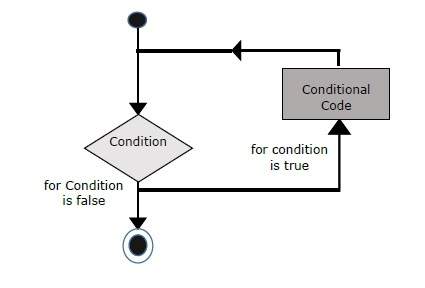The ‘for‘ loop is the most compact form of looping. It includes the following three important parts −
- The loop initialization where we initialize our counter to a starting value. The initialization statement is executed before the loop begins.
- The test statement which will test if a given condition is true or not. If the condition is true, then the code given inside the loop will be executed, otherwise the control will come out of the loop.
- The iteration statement where you can increase or decrease your counter.
You can put all the three parts in a single line separated by semicolons.
Flow Chart
The flow chart of a for loop in JavaScript would be as follows −

Syntax
The syntax of for loop is JavaScript is as follows −
for (initialization; test condition; iteration statement){ Statement(s) to be executed if test condition is true }
Example
Try the following example to learn how a for loop works in JavaScript.
<html> <body> <script type="text/javascript"> <!-- var count; document.write("Starting Loop" + "<br />"); for(count = 0; count < 10; count++){ document.write("Current Count : " + count ); document.write("<br />"); } document.write("Loop stopped!"); //--> </script> <p>Set the variable to different value and then try...</p> </body> </html>
Output
Starting Loop Current Count : 0 Current Count : 1 Current Count : 2 Current Count : 3 Current Count : 4 Current Count : 5 Current Count : 6 Current Count : 7 Current Count : 8 Current Count : 9 Loop stopped!


























